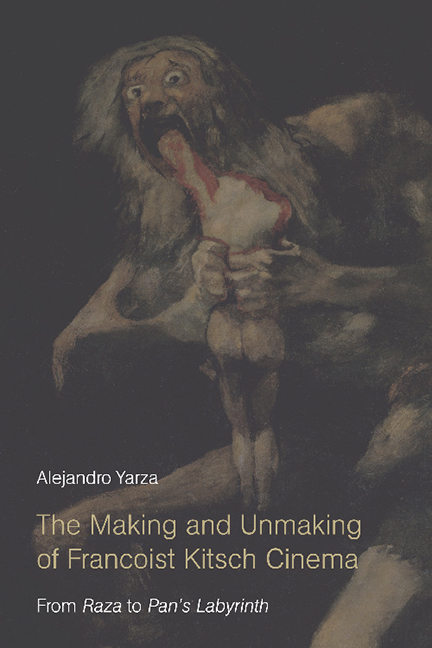Book contents
- Frontmatter
- Contents
- List of Figures
- Acknowledgments
- Preface
- Introduction
- 1 The Petrified Tears of General Franco: Kitsch and Fascism in José Luis Sáenz de Heredia’s Raza
- 2 Romancero Marroquí and the Francoist Kitsch Politics of Time
- 3 Los últimos de Filipinas: The Spatio-temporal Coordinates of Francoism
- 4 Surcos: Neorealism, Film Noir, and the Puppet Master
- 5 Franco, Ese Hombre: From Kitsch-Artist to Kitsch-Man
- 6 Viridiana: The World, the Flesh, and the Devil
- 7 Balada Triste De Trompeta: Of Ghosts and Clowns
- 8 Under the Sign of Saturn: The Labyrinth of Moral Choices in Francoist Spain
- Works Cited
- Index
Introduction
Published online by Cambridge University Press: 10 November 2020
- Frontmatter
- Contents
- List of Figures
- Acknowledgments
- Preface
- Introduction
- 1 The Petrified Tears of General Franco: Kitsch and Fascism in José Luis Sáenz de Heredia’s Raza
- 2 Romancero Marroquí and the Francoist Kitsch Politics of Time
- 3 Los últimos de Filipinas: The Spatio-temporal Coordinates of Francoism
- 4 Surcos: Neorealism, Film Noir, and the Puppet Master
- 5 Franco, Ese Hombre: From Kitsch-Artist to Kitsch-Man
- 6 Viridiana: The World, the Flesh, and the Devil
- 7 Balada Triste De Trompeta: Of Ghosts and Clowns
- 8 Under the Sign of Saturn: The Labyrinth of Moral Choices in Francoist Spain
- Works Cited
- Index
Summary
The side which things turn toward the dream is kitsch
—Walter Benjamin, Selected WritingsDuring his early life as an officer in the Spanish colonial army in Morocco, Francisco Franco was admired for his courage, which, oftentimes verging on reckless, assured him a rapid ascension of the military ladder. Along with his bravery came extreme cruelty. Franco was feared by his soldiers— particularly once he became commander of the Spanish Foreign Legion in 1920—who knew he would not tolerate anything that in his mind amounted to insubordination, no matter how minor the perceived offense. Nevertheless, despite his unflinching sangfroid, and lack of compassion, Franco is reported to have cried often.
In his novel The Unbearable Lightness of Being (1984), Milan Kundera writes that, “Kitsch causes two tears to flow in quick succession. The first tear says: How nice to see children running on the grass! The second tear says: How nice to be moved, together with all mankind, by children running on the grass! It is the second tear that makes kitsch kitsch” (251). It is this second tear that provides the background for this study. The second tear, which flows from being moved together with all mankind— and in Franco's case also caused by a narcissistic identification with his self-appointed messianic role—implies both an initial separation from mankind as well as a longing to be reunited with it again. This longing to recover the original state of grace, to heal the wound opened up by human subjectivity—symbolically represented by the Fall—is the psychological subtext of kitsch. This is why Kundera defines kitsch, among other things, as the “categorical agreement with being” (251).
Since this desire emerges from the very nature of human subjectivity, Kundera concludes that the feeling induced by kitsch cannot depend on unique or unusual experiences, but “must be a kind the multitudes can share” (251). Kitsch, therefore, “must derive from the basic images people have engraved in their memories: the ungrateful daughter, the neglected father, children running on the grass, the motherland betrayed, first love” (251).
- Type
- Chapter
- Information
- The Making and Unmaking of Francoist Kitsch CinemaFrom Raza to Pan's Labyrinth, pp. 1 - 22Publisher: Edinburgh University PressPrint publication year: 2017



